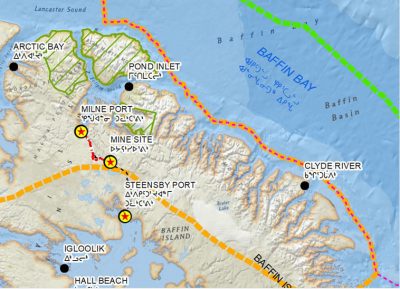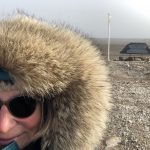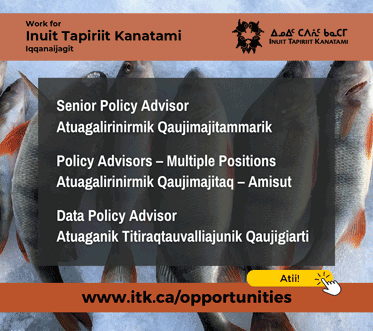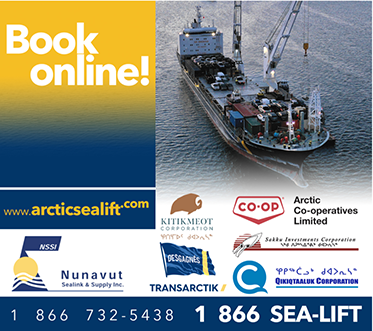Baffinland’s expanded shipping proposal raises concerns at Iqaluit meeting
“The mine has the ability to achieve a gold standard with their ship operations”
Enookie Enuarak of Pond Inlet speaks on June 18 in Iqaluit at the Nunavut Impact Review Board’s technical meeting on Baffinland Iron Mines Corp.’s plans to expand its Mary River mine. Enuarak said that last year, belugas and narwhals abandoned Eclipse Sound after the ice breakup. The disappearance of the whales was “a huge loss to our community” he said. (Photo by Jane George)
To help protect the area’s fish, birds, marine mammals and people, Baffinland Iron Mines Corp. should meet a “gold standard” when shipping from its north Baffin iron mine, delegates said during the second day of the Nunavut Impact Review Board’s three-day technical meeting on the company’s $900-million proposal to expand its Mary River mine.
After sessions looking at the use of Inuit Qaujimajatuqangit and cumulative effects assessments on Monday, attention on Tuesday turned largely to ice-breaking and shipping.
Baffinland plans to ship out 12 million tonnes of ore annually, increasing that amount later to 30 million tonnes.
Several of the Inuit representatives around the table in Iqaluit’s Cadet Hall told how Baffinland’s shipping is already having an impact.

This map, supplied by Baffinland, shows the full extent of the company’s future expansion plans: one railway running north to Milne Inlet and another running south to Steensby Inlet with eventual annual production of 30 million tonnes of iron ore per year. Baffinland’s phase-two expansion plans also includes another railway-port proposal that the company received permission to build with its 2012 project certificate. Eventually a 150-km railway running south to a proposed port at Steensby Inlet would carry an additional 18 million tonnes a year to market on ships sailing through Foxe Basin and Davis Strait. (File image)
Enookie Enuarak of Pond Inlet’s hunters and trappers organization said that last year, belugas and narwhals abandoned Eclipse Sound after the ice broke up.
Hunters say the presence of ships and icebreakers in July disturbs marine mammals and fish, as well as breaking up the ice earlier in this the season, and that this caused misery in the community of about 1,800.
The disappearance of the whales was “a huge loss to our community” of food and sales of meat, maqtaaq and tusks as well as a cause of health issues, said Enuarak.
He said he feared “all wildlife will be impacted due to the large scope of the project.”
“You’re going to make a lot of money,” he told the Baffinland representatives sitting across the table. “But for us there is no gain of anything.”
That prompted Baffinland’s vice-president of sustainability, Megan Lord-Hoyle, to say that there may be reason for the mining company to look at additional support for hunters and community members.
There were concerns about other wildlife as well: Igloolik’s Peter Ivalu said he’s worried about the impact on walrus of shipping through Steensby Inlet, while Eric Ootoova from Pond Inlet said early ice-breaking disturbs the cod that feed migratory birds.
The Department of Fisheries and Oceans said it it’s concerned about the displacement of marine mammals and fish, and that this requires further study.
Under its “phase-two” proposal, now under scrutiny at the meeting in Iqaluit, Baffinland plans to jack up the mine’s production, using 175 huge Panamax ships, which are 32.31 metres (106 feet) long, starting as early as July 1, to carry ore to market.
These ships will run on heavy fuel oil, emit lots of black carbon and will plough through ice favoured by marine mammals, early in the season.
Ships coming to Baffinland will use cleaner distillate and diesel fuels when international regulations kick in next year, says Baffinland’s marine shipping contractor, Fednav.
But the World Wildlife Fund’s shipping specialist, Andrew Dumbrille, criticized that stance. Regulations are the bare minimum, he said, and in some cases they don’t do enough to reduce impacts to an acceptable level.
“The consequences from an oil spill, for instance, are so high that the standard for operations also have to be high,” he said. “Going beyond the bare minimum is essential with the shipping operations for the mine.”
But Mike Cooper, Fednav’s manager of capital projects, maintained Baffinland can’t force ships chartered by the mine to avoid heavy fuel oil use.
“We hear often about shipping operations and mitigation measure that ‘it’s out of our hands, we have to follow international rules’,” Dumbrille said. “It’s not. Baffinland has plenty of control over the contracts with the ship operators that are servicing the mine. Like mandating a speed limit of nine knots.”
That speed limit is intended to help avoid animal strikes.
Dumbrille said any other issues can be handled in the same way, like fuel use and switching away from heavy fuel oil, ballast exchange and treatment, when to transit in ice or not, where to transit, how to reduce emissions “and the list goes on.”
“The mine has the ability to achieve a gold standard with their ship operations,” he said.
Another big concern raised on day two of the technical meeting involves dust from the mine’s operations, which representatives from Pond Inlet say goes far beyond the footprint of the port, mine or road.
According to Enuarak, the dust is so bad that it turned a white fox pink.
Baffinland said it has several plans to mitigate dust, such a using dust suppressants and covering its new crusher, proposals that earned the company praise from community representatives.
The technical meeting wraps up Wednesday at noon although some of the parties will continue to meet this week to resolve outstanding issues.
Due to issues with lodging and the number of expected participants, the NIRB has decided to split its upcoming final public hearing between Pond Inlet, from Sept. 23 to Sept. 27, and Iqaluit, from Sept. 30 to Oct. 4.
This means the NIRB will issue its recommendation on the project after the Oct. 21 federal election.







I always thought that Narwale were to only harvested as food source. Not to be killed for the sale of their tusk. IF that is what is happening then it should be stopped. The Narwhale population will be another food source that will become endangered.
Rest assured, the complete Narwhal is used every time.
Most narwhals harvested are eaten, some are lost in the depths of the sea. If there was a tusk; then at $300/foot fetches the hunter good hard cash.
I highly doubt added shipping affects them much. If so; then we should stop shipments to and from all communities.